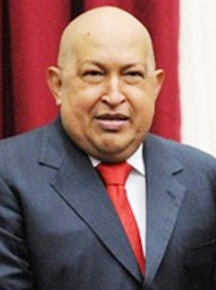CARACAS, (Reuters) – Of many surreal moments in the life and times of Hugo Chavez, the flamboyant Venezuelan leader’s encounter with a puppet of himself this week was one of the wackiest.

Despite his convalescence from cancer surgery and four rounds of chemotherapy, the 57-year-old Chavez has since the start of October been hitting the air-waves like the old days, with phone-ins to state TV any time from dawn to midnight.
So when a supporter produced a life-sized puppet of the ‘Comandante’ on state TV, Chavez enthusiastically called in for the third time that day and was expounding on indigenous land rights when, embarrassingly, the puppet’s trousers fell down.
“Tie them up, brother! You can’t let Chavez’s trousers fall down,” he laughed in a clip (http://tinyurl.com/6hgnf37) that naturally has been a hit in cyber-space.
To supporters, the incident showed his sense of humor. To detractors, it was buffoonery unbefitting of a president. The wider message from his return to the air-waves was clear: Chavez’s energy-levels and omnipresence are returning.
“It’s not time to die, it’s time to live! To those who want me dead, I tell them that soon my return will be complete,” Chavez said in what has become a daily mantra.
Having disappeared from public view for several weeks in June, when he had a cancerous tumor removed in Cuba, Chavez first returned to Venezuela with a drastically curtailed lifestyle, serious demeanor and sporadic public appearances.
His illness, and the specter of his disappearance from the stage he has dominated since taking power in 1999, turned Venezuelan politics upside down heading into an election year.
But more than three months on, Chavez says four rounds of chemotherapy have been successful and tests he is due to take in Cuba this weekend will declare him cancer-free.
He clearly feels upbeat, re-energized — and desperate to show it. Yet cancer experts say it takes several years before anyone can be confident they have beaten the disease.
“If you were my patient, and you said you had just finished chemotherapy two weeks ago and you were cured, I would say that is absolutely ridiculous,” said a U.S. specialist, who asked not to be named. “It is much too early to say.”
RAP AND RHETORIC
As well as the regular phone-ins, Chavez has in recent days been hosting events at his Miraflores presidential palace, including the launch of a coalition he hopes will propel him to re-election in an October 2012 vote.
At that event, he briefly danced a rap with young Venezuelan singers and then chaired an hours-long meeting — his longest public showing since the surgery in Havana.
Pushing a message that he remains firmly in control of government, Chavez is also back to personally receiving visiting dignitaries. In the last week, he has hosted Palestinian President Mahmoud Abbas to rail against U.S. and Israeli policies and signed a clutch of oil deals with Russian deputy prime minister Igor Sechin.
While there has been plenty of laughter in the charismatic Chavez’s latest appearances, the tough streak that has polarized Venezuela and made him one of the world’s most controversial figures has also re-emerged.
